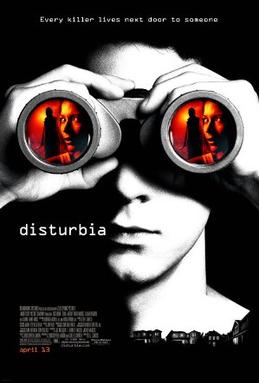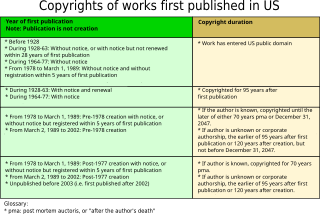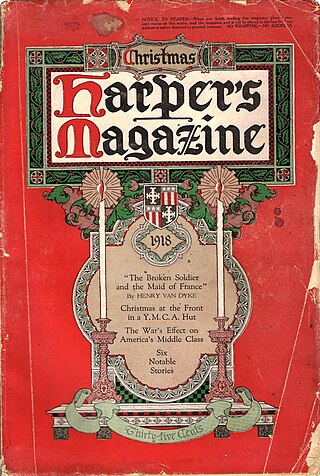A copyright is a type of intellectual property that gives its owner the exclusive right to copy, distribute, adapt, display, and perform a creative work, usually for a limited time. The creative work may be in a literary, artistic, educational, or musical form. Copyright is intended to protect the original expression of an idea in the form of a creative work, but not the idea itself. A copyright is subject to limitations based on public interest considerations, such as the fair use doctrine in the United States.
Fair use is a doctrine in United States law that permits limited use of copyrighted material without having to first acquire permission from the copyright holder. Fair use is one of the limitations to copyright intended to balance the interests of copyright holders with the public interest in the wider distribution and use of creative works by allowing as a defense to copyright infringement claims certain limited uses that might otherwise be considered infringement. Unlike "fair dealing" rights that exist in most countries that were part of the British Empire in the 20th century, the fair use right is a general exception that applies to all different kinds of uses with all types of works and turns on a flexible proportionality test that examines the purpose of the use, the amount used, and the impact on the market of the original work.
A work made for hire, in copyright law in the United States, is a work that is subject to copyright and is created by employees as part of their job or some limited types of works for which all parties agree in writing to the WFH designation. Work for hire is a statutorily defined term and so a work for hire is not created merely because parties to an agreement state that the work is a work for hire. It is an exception to the general rule that the person who actually creates a work is the legally-recognized author of that work. In the United States and certain other copyright jurisdictions, if a work is "made for hire," the employer, not the employee, is considered the legal author. In some countries, this is known as corporate authorship. The entity serving as an employer may be a corporation or other legal entity, an organization, or an individual.

Rear Window is a 1954 American mystery thriller film directed by Alfred Hitchcock and written by John Michael Hayes based on Cornell Woolrich's 1942 short story "It Had to Be Murder." Originally released by Paramount Pictures, the film stars James Stewart, Grace Kelly, Wendell Corey, Thelma Ritter, and Raymond Burr. It was screened at the 1954 Venice Film Festival.

Itar-Tass Russian News Agency v. Russian Kurier, Inc., 153 F.3d 82, was a copyright case about the Russian language weekly Russian Kurier in New York City that had copied and published various materials from Russian newspapers and news agency reports of Itar-TASS. The case was ultimately decided by the United States Court of Appeals for the Second Circuit. The decision was widely commented upon and the case is considered a landmark case because the court defined rules applicable in the U.S. on the extent to which the copyright laws of the country of origin or those of the U.S. apply in international disputes over copyright. The court held that to determine whether a claimant actually held the copyright on a work, the laws of the country of origin usually applied, but that to decide whether a copyright infringement had occurred and for possible remedies, the laws of the country where the infringement was claimed applied.
The history of copyright starts with early privileges and monopolies granted to printers of books. The British Statute of Anne 1710, full title "An Act for the Encouragement of Learning, by vesting the Copies of Printed Books in the Authors or purchasers of such Copies, during the Times therein mentioned", was the first copyright statute. Initially copyright law only applied to the copying of books. Over time other uses such as translations and derivative works were made subject to copyright and copyright now covers a wide range of works, including maps, performances, paintings, photographs, sound recordings, motion pictures and computer programs.
The first-sale doctrine is an American legal concept that limits the rights of an intellectual property owner to control resale of products embodying its intellectual property. The doctrine enables the distribution chain of copyrighted products, library lending, giving, video rentals and secondary markets for copyrighted works. In trademark law, this same doctrine enables reselling of trademarked products after the trademark holder puts the products on the market. In the case of patented products, the doctrine allows resale of patented products without any control from the patent holder. The first sale doctrine does not apply to patented processes, which are instead governed by the patent exhaustion doctrine.
Software copyright is the application of copyright in law to machine-readable software. While many of the legal principles and policy debates concerning software copyright have close parallels in other domains of copyright law, there are a number of distinctive issues that arise with software. This article primarily focuses on topics particular to software.
A copyright is the legal protection extended to the owner of the rights in an original work. Original work refers to every production in the literary, scientific, and artistic domains. The Intellectual Property Office (IPOPHL) is the leading agency responsible for handling the registration and conflict resolution of intellectual property rights and to enforce the copyright laws. IPOPHL was created by virtue of Republic Act No. 8293 or the Intellectual Property Code of the Philippines which took effect on January 1, 1998, under the presidency of Fidel V. Ramos.
The Jordanian Copyright Law and its Amendment No. (22) for the year 1992 is based on the Berne Convention for the Protection of Literary and Artistic Works and does not contain a definition of copyright; however in Article (3) it clearly states that the law offers legal protection to any kind of original work in literature, art and science regardless of the value or purpose of the work.

Disturbia is a 2007 American neo-noir psychological thriller film directed by D. J. Caruso and written by Christopher Landon and Carl Ellsworth. Starring Shia LaBeouf, David Morse, Sarah Roemer and Carrie-Anne Moss, it is about a teenager who is placed on house arrest for assaulting his school teacher and begins to spy on his neighbors, believing one of them is a serial killer.
In United States copyright law, transformative use or transformation is a type of fair use that builds on a copyrighted work in a different manner or for a different purpose from the original, and thus does not infringe its holder's copyright. Transformation is an important issue in deciding whether a use meets the first factor of the fair-use test, and is generally critical for determining whether a use is in fact fair, although no one factor is dispositive.

In copyright law, a derivative work is an expressive creation that includes major copyrightable elements of a first, previously created original work. The derivative work becomes a second, separate work independent in form from the first. The transformation, modification or adaptation of the work must be substantial and bear its author's personality sufficiently to be original and thus protected by copyright. Translations, cinematic adaptations and musical arrangements are common types of derivative works.
The copyright law of the United States grants monopoly protection for "original works of authorship". With the stated purpose to promote art and culture, copyright law assigns a set of exclusive rights to authors: to make and sell copies of their works, to create derivative works, and to perform or display their works publicly. These exclusive rights are subject to a time limit and generally expire 70 years after the author's death or 95 years after publication. In the United States, works published before January 1, 1928, are in the public domain.

Works are in the public domain if they are not covered by intellectual property rights at all, or if the intellectual property rights to the works have expired.

Euro-Excellence Inc v Kraft Canada Inc, 2007 SCC 37, [2007] 3 S.C.R. 20, is a Supreme Court of Canada judgment on Canadian copyright law, specifically on the issue of indirect infringement and its application to parallel importation. Kraft Canada sued Euro-Excellence Inc. for copyright infringement due to their importation of Côte d’Or and Toblerone chocolate bars from Europe into Canada. A majority of the court found that the copyright claim could not succeed, although they split on whether the claim failed due to the rights of an exclusive licensee or due to the scope of copyright law.
Petrella v. Metro-Goldwyn-Mayer, Inc., 572 U.S. 663 (2014), is a United States Supreme Court copyright decision in which the Court held 6-3 that the equitable defense of laches is not available to copyright defendants in claims for damages.
In the early 1930s, Jerry Siegel and Joe Shuster developed the fictional comic book character of Superman. In 1938, they sold the character to Detective Comics, Inc.. After Superman became an unexpected success, the pair attempted to recover the rights to the character. This began a long chain of legal battles over ownership, royalties, and credit that would continue after their deaths.

A collective work in the copyright law of the United States is a work that contains the works of several authors assembled and published into a collective whole. The owner of the work has the property rights in the collective work, but the authors of the individual works may retain rights in their contributions. Electronic reproduction of the whole work is allowed, but electronic reproduction of the individual works on their own, outside the context of the work as a whole, may constitute an infringement of copyright.
Mills Music, Inc. v. Snyder, 469 U.S. 153 (1985), was a United States Supreme Court case in which the Court held that if the author of a work authorizes derivatives, the terms negotiated in exchange for that grant stand even if the grant is later rescinded. If the copyright holder deputizes another person to authorize derivative works, the law draws no distinction between such works and those directly authorized by the copyright holder.







